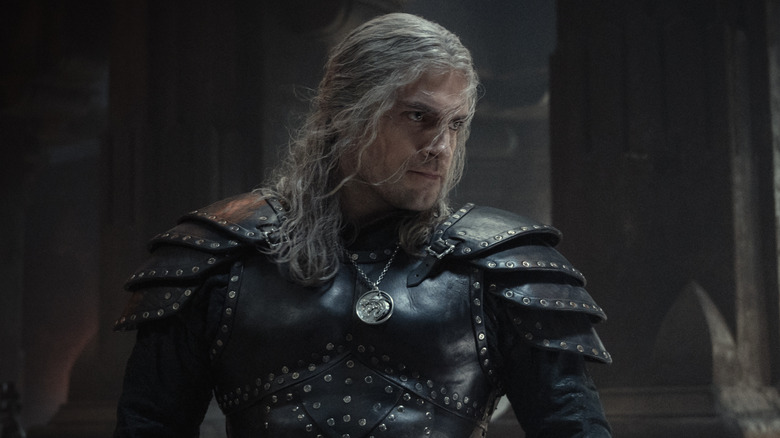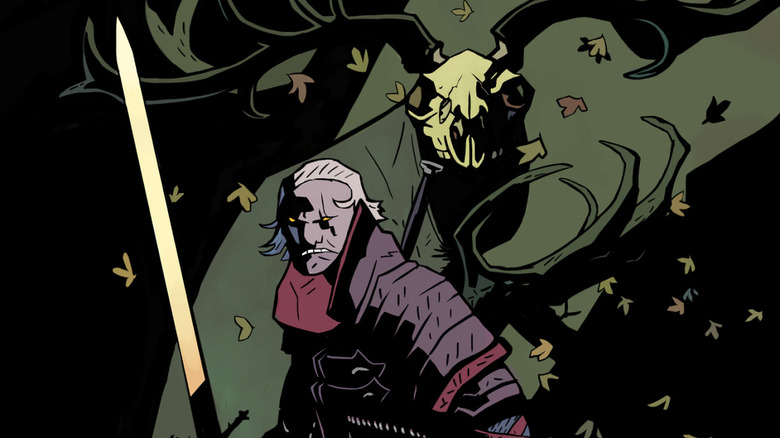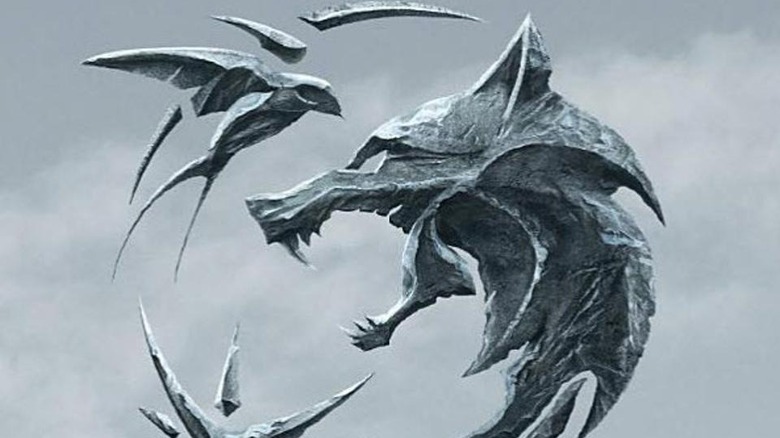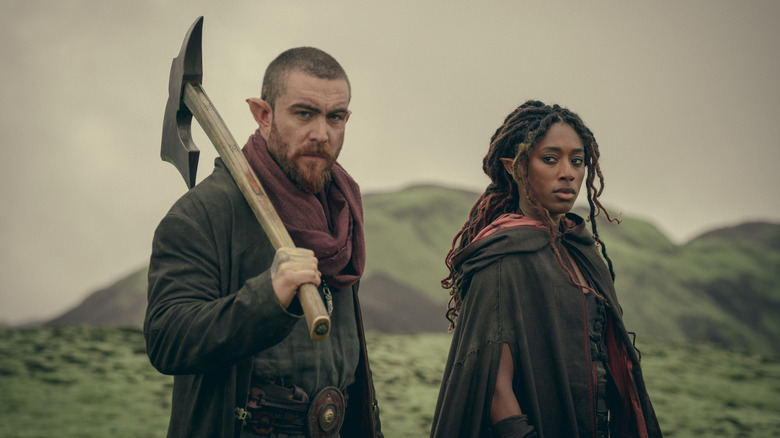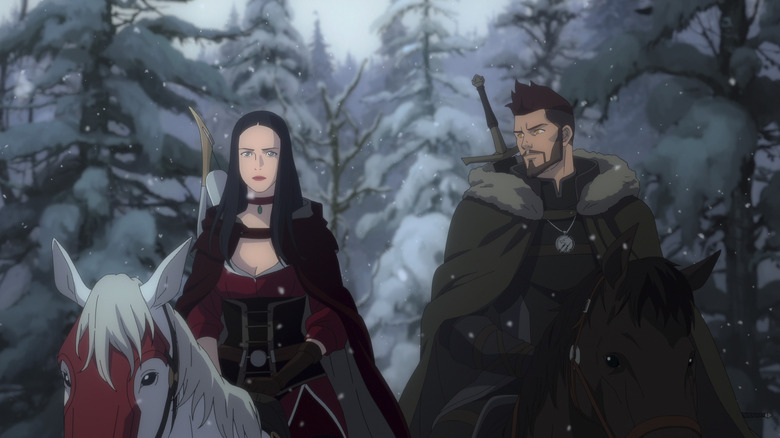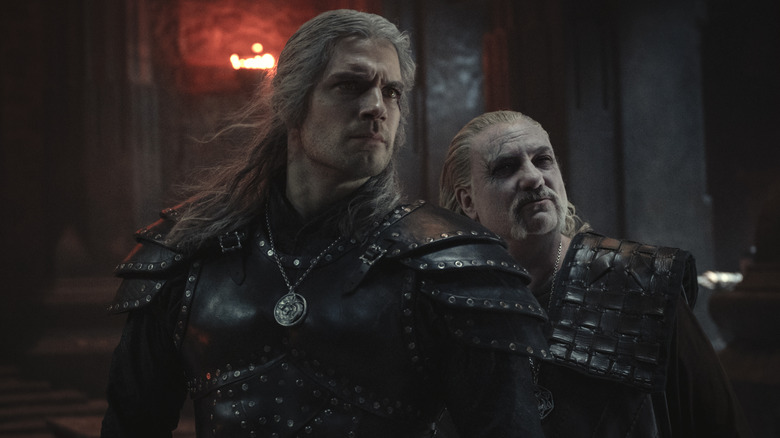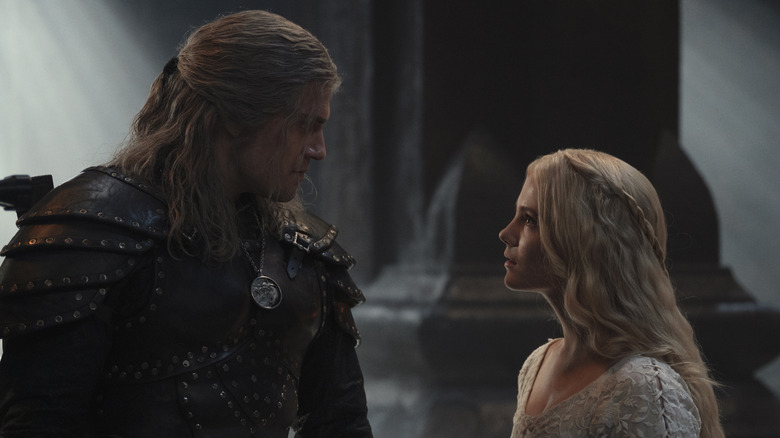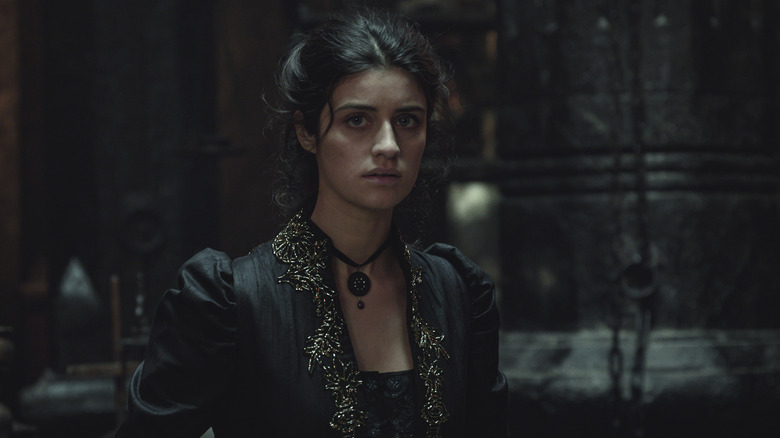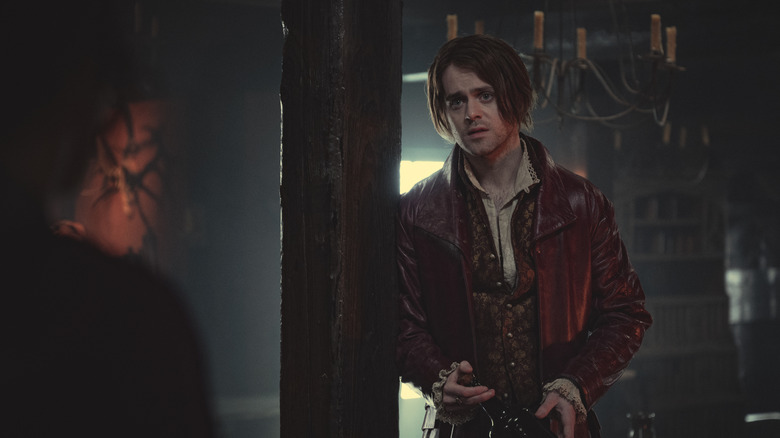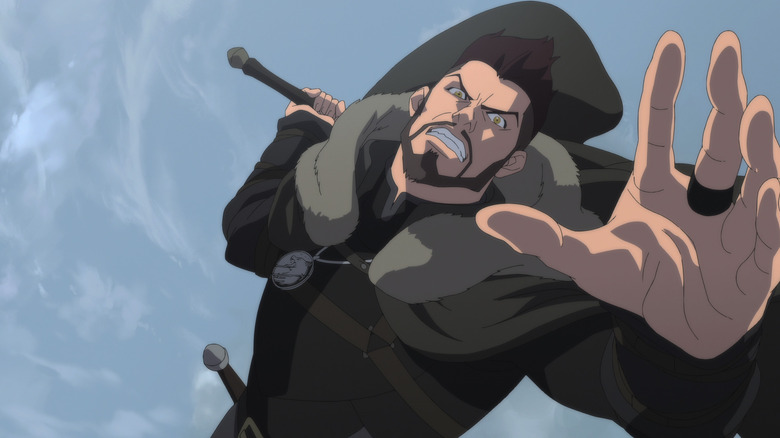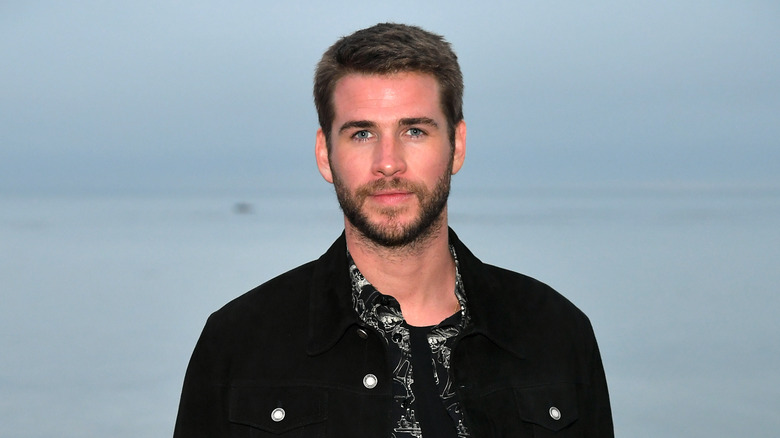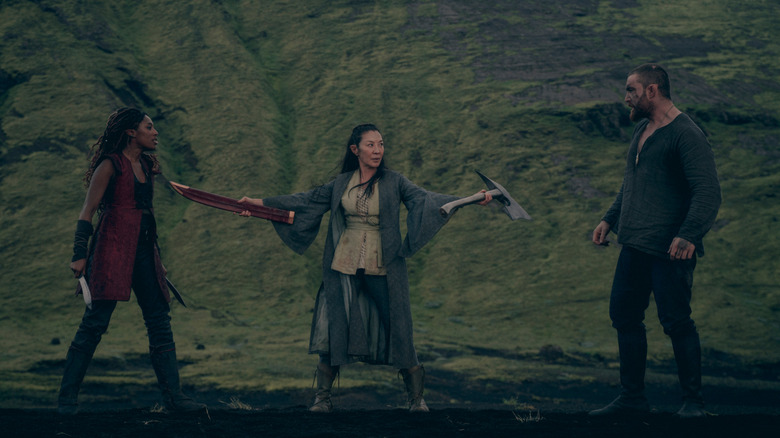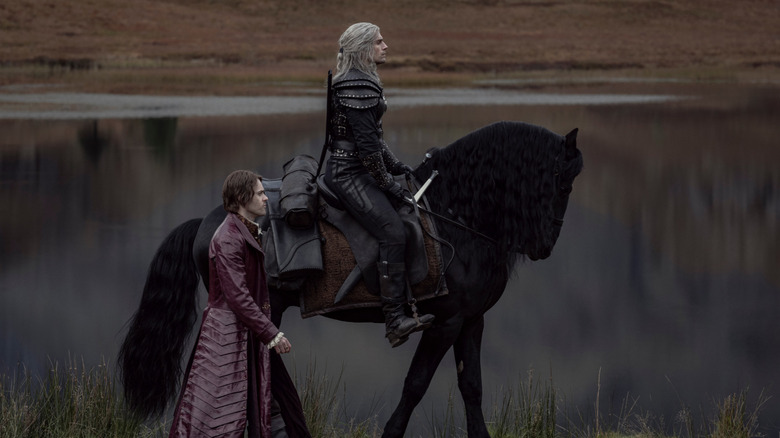Why Netflix's Witcher Universe Could Be Too Big To Fail
For a series that hasn't yet cleared its 20th episode, "The Witcher" has seen everything from major cast shakeups to weakening ratings and the critical panning of a certain four-episode spin-off. For a production fraught with so much conflict, some have called the future of the franchise in question, wondering if Netflix will continue on with it or if it'll go down in history as an attempt at an adaptation that never quite clicked. With a fourth season still on the books as far as anyone knows, the major cast change from Henry Cavill to Liam Hemsworth could well be the final nail in the coffin for the streamer's affiliation with the series.
However, even with so many Netflix series canceled well before their potential is fulfilled these days, walking away from "The Witcher" would be an egregious error, as the franchise has a lot more going for it than most other fantasy series today. With a story mostly untapped, an incredibly strong fanbase, a stellar supporting cast, a unique world that has only begun to be fleshed out, and an iconic lead character whose philosophical wanderings that made him such a legend among fantasy readers have not yet been fully embraced, this is a story that still has a lot more to give. We're not saying we don't have our criticisms, just that we're not ready to say goodbye quite yet. Here are some of the reasons we still have lots of hope in our hearts for "The Witcher."
It's a multimedia giant with hit games and comics behind it
Fans of the franchise generally know that the show is based on a series of books by Andrzej Sapkowski, but it's not a concept restricted to only one medium. Indeed, while the books are all smash successes, clearing 15 million sales worldwide, "The Witcher" also found a wider audience through the equally successful games based on the premise. The open-world RPG format of the series unveils a whole world of side quests, making them endlessly engaging. The third in the series, "The Witcher: Wild Hunt" has been called by many one of the best games in recent memory by critics and players alike.
There has already been a Polish-language film adaptation and TV series under the also awesome name of "The Hexer," both of which debuted in the early 2000s and have their fair share of decriers for many of the same things Netflix's "The Witcher" has been criticized for, like cutting certain stories short and skipping major character beats. Yet, as always, the world of comics has been working to fill in some of the things that TV and film sometimes necessarily miss.
They haven't even tapped the potential of the books
No matter what comes next, "The Witcher" novels are absolute must-reads for fans of fantasy, combining the world-building of J.R.R. Tolkien's "Lord of the Rings" with the brooding heroics of Robert E. Howard's "Conan the Cimmerian," alongside some good old-fashioned soap and epic fight scenes along the way. Perhaps most importantly, the philosophy of the series is unique, not just in fantasy but in fiction, period, with Geralt avoiding easy morality or absolvement of his actions regardless of whether they are necessary or not. Likewise, even the most villainous character is rarely reduced to a simplistic archetype, while the heroes struggle with their own complicity in wars they can't hope to control.
Though we've certainly seen bits and pieces of this, the Netflix series' biggest failing to date might be its lack of exploration into the complicated ethics of the novels. Though it wouldn't be easy to bring to life, it would likely be well worth the extra effort it took if it landed well. Beyond that, there is a lot of untouched plot, with only highlights from the books "Last Witch," "Sword of Destiny," and the pending third season, "Blood of Elves," having seen the light of day so far. We respect the changes an adaptation has to make to bring the story to life in a different medium, but here's hoping the show gets more space, not less, to see some of the concepts behind the novels through.
Even on the critically panned Blood Origins, ratings may prove interest
Released on Christmas Day in 2022, "The Witcher: Blood Origin" is now infamous for having the lowest audience and critical scores ever, making it well-known for all the worst reasons. A jump into the past, the show delves into the events surrounding the fall of the Elven empire, explaining some key elements of the main series in a four-episode jaunt through history. Featuring a stellar cast that ultimately didn't have a ton of space to impress, it's easy to understand some ire toward the mini-series, but the production values and fight scenes are still pretty great.
It's difficult to find solid information about viewership, but Netflix reported high numbers during its release week, with the show sitting at #1 on the site for at least some period of time. It's hard to say whether time will change the devastating panning the series has received, but even the initial interest in the four-parter alone could be taken as evidence that fans are dying to see more of "The Witcher."
High hopes are hard to live up to and it's true that "Blood Origin" leaned into too many shortcuts in service of an already basic plot, but it could be a hasty move to call this a death knell for the franchise considering that it had some upsides in expanding "Witcher" lore, as well as how widely discussed the show was even as it was dismissed.
Nightmare of the Wolf indicates people are dying to see inventive expansion
On the other side of things, the animated film spin-off, "The Witcher: Nightmare of the Wolf," has been heavily praised by the critics who took the time to watch it, indicating that delving into the lore of the franchise isn't going to be a dealbreaker for viewers. Again set in the past, this story takes us back to a time when there were a lot more Witchers than there are during the series and reveals what happened to a lot of them while offering a peek into Vesemir's backstory. Though we know him as a loveable curmudgeon, we find out here that Vesemir is a romantic at heart, despite how much he's fought that in himself, as we see the fate of his love from childhood, Lady Illyana.
This film features great animation and incredible fight scenes, as well as some top-notch voice actors like Theo James and Mary McDonnell, and it's won a lot of viewers over due to its hopelessly romantic tragedy alongside all of the epic struggle that makes "The Witcher" so great. Seeing Vesemir take in a handful of young Witchers and vowing to train them regardless of what lay ahead gives us a glimpse into the early days of Geralt, but is deft enough that it doesn't make it its reason for existence. History can be just as fun as anything else in "The Witcher," and "Nightmare of the Wolf" proves it.
Even losing Henry Cavill did nothing to dissuade another season
In late 2022, fans were disappointed to hear that Geralt himself, Henry Cavill, would be leaving "The Witcher" after the third season. On October 24, the star posted on Instagram that he would be returning to the DC Universe in the role of Superman, however, anyone who has been watching their news feed will know this didn't exactly pan out. After meeting with the new head of the DCEU, James Gunn, Cavill confirmed that they would be going a different direction with the character, and he wouldn't be returning as Superman, after all. Yet, per Variety, that news doesn't mean Cavill will return to "The Witcher," from which he appears to have moved on.
This is the kind of rollercoaster we hate being on, but here's hoping it all works out in the end. Cavill likely won't be at a loss for pending roles and we have a new actor in the role of Geralt. Though fans have been a bit torn on the introduction of Hemsworth in the role of Geralt, to say the least, it says something for the concept itself that even losing major star power with Cavill didn't halt or apparently even pause plans for the pending fourth season. Though it's impossible to say what further surprises are in store, we can say one thing, and that's that this franchise sure keeps us on our toes.
In the Netflix series alone, there is a lot left untold
As we noted, there is a whole lot going on in the novels that have yet to make it to the screen, and that's true of the games, as well. The amount of story just waiting to be tapped is wild, but even setting that aside, the series hasn't gotten around to fulfilling its own plotlines as of yet. Though the third season will no doubt shed some light on some of our lingering questions, we kind of have a lot of them. Naturally, the main one is, will Geralt and Yennefer (Anya Chalotra) be able to reconcile after her second season betrayal, considering she saw reason in the end? It endangered him and Ciri (Freya Allan) and indirectly caused the deaths of several Witchers, so it's kind of a big one to overcome.
Further, the Wild Hunt appeared in the second season, so we can only assume they're going to play a huge role in the third and possibly fourth. Are they going to go after Ciri? Likewise, what is going on with her father and how did he survive when we've believed him to be deceased this entire series? Perhaps the most pressing, now that many of the Witchers have died, is whether there going to be a new school on the horizon to train more, and if so, how will Geralt do things differently to avoid the level of the trauma he sustained as a child?
The cast is ridiculously talented
Plenty has been said about how perfectly cast Cavill was as Geralt, and it's a hard one to argue, considering how deeply invested he was in the role and his status as an official nerd himself. Yet, that shouldn't detract from how perfectly cast literally every other actor in the show is. For starters, even in animation, casting Theo James as Vesemir was a stroke of genius, but having Kim Bodnia step into the role on the series as an older, wiser Vesemir truly made the character click. This is true for every character, with Allan's take on Ciri showing her to be the perfect, defiant reflection of Geralt that the series demanded she become.
There are so many great actors on this cast that we could watch the show with or without Geralt pretty much indefinitely, with a special nod to MyAnna Buring in the role of the complicated Tissaia de Vries, Yennefer's mentor who struggles to juggle lesser evils, and Royce Pierreson as Istredd, who loves Yennefer as she once was but struggles with who she's become.
Yet, perhaps most importantly, who else could have brought the Mercurial Yennefer to life than Chalotra, who is able to portray Yennefer's positive and negative attributes with equal dedication and candor, making her one of fantasy's most fascinating antiheroes? There's more to name, but the point is, Cavill isn't the only great actor in the series, and we'd love to see more of them all.
The supporting characters have a lot more to give
Even outside of the main cast — Yennefer, Geralt, and Ciri — the show is full of great supporting characters that we haven't seen enough of. Jaskier's (Joey Batey) story has mostly revolved around one-liners and his hurt feelings over Geralt sending him away in a moment of frustration in Season 1, but he's a more complicated character than first meets the eye. Likewise, Triss (Anna Shaffer) is an ally of Geralt's whose backstory has only slightly been fleshed out, yet every tidbit we learn just makes us want to know more about her. For both Jaskier and Triss, the books and games have shown us that more characterization is just waiting there, yet to be fully explored.
Vesemir's turn in "Nightmare of the Wolf" shows us that there is plenty about the lore of Witchers that we still know next to nothing about, which goes double for the long and storied life of Vesemir himself. His camaraderie with Geralt got some focus in Season 3 as the two tragically watched many of their fellow Witchers perish on the grounds of his School of the Wolf.
The elf that helped Ciri survive, Dara (Wilson Radjou-Pujalte), has had little development, and we're dying to know more, as with characters like Tissaia, Fringilla Vigo (Mimi Ndiweni), and Istredd, among many others. Not every character can take the spotlight, but to leave the series now would mean leaving a lot of characters in limbo.
The potential for spin-offs is endless
With the problems surrounding "Blood Origin," it might be a while before we see Netflix exploring further spin-off options with the series, but that's a huge shame considering that we maintain "Blood Origin" wasn't as bad as people make it out to be and "Nightmare of the Wolf" was absolutely awesome. Even if it's not something executives look at following through on any time soon, as we've noted, there is a whole lot of galaxy to explore when it comes to "The Witcher," and it hasn't even remotely approached its end. For instance, a whole series, animated or live-action, around Vesemir's intense life story would be welcome, as would a show based on the lives of the many Witchers of his day that we know to be doomed.
Tissaia's life is equally fascinating, and delving into it a bit more could make for a show in and of itself, as could the deeply complicated political structures of the elves at any time in "The Witcher" history. If Geralt opens a school, his new trainees might make for ideal spin-off candidates, and, when the main series ends, we can only assume we're going to want to see more of Ciri, Yennefer, Jaskier, Triss, and more. If they manage to pull this series back from the brink, there's a lot more that could follow, and even if it's all in the realm of the imagination at present, it's still a lot of fun to think about.
That Hemsworth star power
"The Witcher" fans overall don't seem to be particularly enthused about the addition of Hemsworth in the role of Geralt, and it's understandable to feel conflicted, considering how iconic Cavill was in the role and our relative lack of knowledge about Hemsowrth's ability to bring Geralt to life. However, we have yet to see what he can do with the role, so taking a step back and letting it play out as it will is the only way to go. We know from his work in "The Hunger Games" that he's no stranger to the world of the moody action-adventure, so, chances are, he might find new ways to click with the character.
However, the Hemsworth star power is nothing to scoff at, with Liam's older brother Chris making waves as Thor in the MCU to the point that it's the face most people think of when they imagine the character. Likewise, Luke Hemsworth has his own fantasy credits in the sci-fi epic, "Westworld," making this a family that has made major strides in the realm of SFF movies and TV well before "The Witcher" was even in production. The critics may be right in calling this a series-ending move, but we're going to choose optimism and hope for the best from the youngest among the Hemsworth brothers.
The world-building is limitless
"The Witcher" takes place on a planet that is a lot like Earth, but it doesn't mean that it's necessarily the Earth that we know, and it's regularly referred to as "The Globe." Like our Earth, it orbits a sun-like star referred to by the name of Feainn. It has a moon, but unlike our planet, each month begins on the New Moon, and the full moon has a tendency to last more than just a single night. Most of its land mass is gathered throughout its Northern hemisphere, which, along with the unique astronomic characteristics of the planet, means that there is some cyclical instability to contend with and that it may at some point enter an Ice Age somewhere on the distant horizon.
This is to say that, while, like many fantasy franchises, the world remains quite a bit like our own, it also means that this is a planet where untold monsters roam and simple concepts like night and day take on a slightly looser meaning. The map generally focuses on the Northern and Eastern Lands, the Nilfgaardian Empire, and the Far North, but that leaves a whole lot left to explore. Even what we know of the planet itself is limited in the series, meaning that there is a wide-open arena that creators could build on top of if they had the space to do so. Again, we've only seen glimpses of this, but we'd love to see more.
There is so much room to grow
The world of fantasy adaptations is in a wild place right now, with heavy hitters like "Lord of the Rings" and "Game of Thrones" releasing prequels and new adaptations like "The Wheel of Time" seemingly in limbo after a top-notch first season. With the shifting TV landscape that is seeing more and more premature cancelations, it wouldn't exactly come as a shock to see this network pull its involvement from the show, allowing it to come to an end. Yet, even with the missteps, "The Witcher" is fully capable of achieving greatness, as seen already in some of the best moments of the series.
Regardless of Netflix's level of commitment, Geralt's story has captivated fantasy fans in no small part due to his complexity, and the show has yet to fully dive into that in the way that fans of the novels have so enjoyed over the years. Fleshing out his philosophical questions could give the series the heart it occasionally lacks when Geralt is without other characters to play off of.
Still, with or without Netflix, this is a franchise that will likely continue to expand exponentially over time, even if it occurs in other mediums, like comics and games. Sapkowski gave us a heck of a blueprint for a multimedia franchise, so here's to seeing a lot more of Geralt of Rivia, Yennefer of Vengerberg, Princess Ciri, and their many friends and foes.
